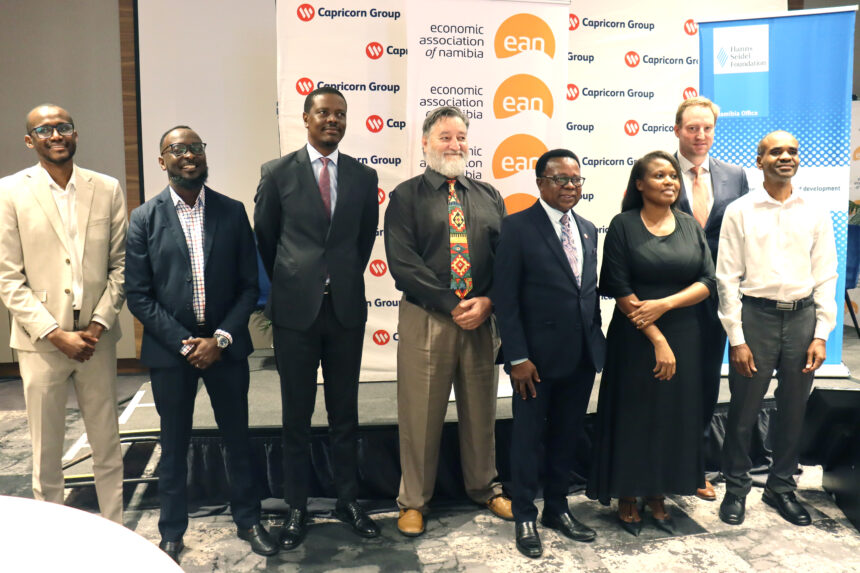Today, a baptism of fire is slated for new finance minister Erica Shafudah.
With less than 120 hours since landing the position, she has a mammoth task to table a national budget that is in tandem with the bold commitments of the new administration, which includes creating 250 000 jobs in the next five years.
The national budget, scheduled for tabling this afternoon, will likely see an increase in capital expenditure, which should bode well for the construction sector and employment prospects.
However, domestic revenue could be under pressure due to significant downward adjustments from Southern African Customs Union (SACU) revenue and notable challenges in the diamond mining sector.
This assessment comes from economist Klaus Schade, who pointed out that new President Netumbo Nandi-Ndaitwah has certainly been involved in the compilation of the national budget to ensure her priorities are reflected, even if she was only sworn in on 21 March.
Reforms
He noted that while a number of high-level ministerial positions have become redundant due to the Cabinet’s streamlining, this is not expected to have an immediate impact on expenditure as these are public servants, and noteworthy savings are mostly limited to minister-related costs.
“After the bold steps to cut the size of Cabinet, there is a need for bold reforms of the income tax and corporate tax system. Tax-deductible allowances benefit the better-off, inflation has resulted in tax bracket creeping, and lower corporate taxes for start-ups could encourage business and job-creation. The zero-rating of VAT for various items should be reconsidered, while the introduction of taxes on unhealthy food items such as sugary drinks and salty snacks, or environmental levies in electric geysers, should be considered to encourage healthy living standards and increase revenue,” Schade stated.
Seasoned executive and Capricorn Group CEO David Nuyoma observed that the upcoming budget would carry a weight of expectations.
“The shareholders of the government are the people. They have made their demands on political parties, which have been expressed through manifestos. Now, it is time for a reality check. Therefore, priorities must be set to realise that balancing act. It requires all of us as citizens, in our various formations, not just to throw stones, but to continue the constructive contributions through engagement with those who have this enviable task of doing what needs to be done,” said Nuyoma.
Meanwhile, Salomo Hei, managing director of High Economic Intelligence (HEI), emphasised the transformative potential of the budget as a tool not only for economic steering, but also for social progress.
During a pre-budget event, organised by the Economic Association of Namibia (EAN) in partnership with Capricorn Group Limited and the Hanns Seidel Foundation Namibia, he highlighted that Namibia should not be experimenting at 35 years. “We should not use the budget as a single tool for the transformation of the Namibian economy. We need policy clarity for clear transformation,” Hei noted. The pre-budget discussion was hosted on Tuesday, 25 March under the theme ‘Balancing Growth and Social Upliftment: The National Budget in a New Dispensation.’
“We must be clear around the oil and gas topic: to what extent will it belong to Namibians in terms of ownership, and clearly transform Namibia? The budget, although constrained, is one of the many tools for Namibian economic transformation,” he said.
“We need to do more direct interventions on needed work, and depending on healthcare is not the problem. It is the allocation of funds with no visible outcomes,” Hei continued.
EAN chairperson Jason Kasuto provided a focused analysis of public-private sector collaboration in the execution of the national budget. He emphasised the need for pragmatic solutions to address Namibia’s economic stagnation, noting the country is only five years away from Vision 2030, but still grappling with high unemployment and bureaucratic inefficiencies. He cautioned against over-reliance on the budget as a singular tool for economic transformation, instead advocating for policy clarity and well-defined strategies for utilising natural resources such as oil and gas.
Kasuto also urged a focus on economic decentralisation through strategic infrastructure investments, and, therefore, “we should be cautioned and lend an ear to the analysis to best guide us”.
Professor Teresia Kaulihowa, Associate Dean at the Namibia University of Science and Technology, shed light on the human development angle of the budget. She stressed the importance of a people-centred budget which prioritises human capital development and inclusive growth. In addition, chief economist at Capricorn Asset Management Floris Bergh presented a macro-economic and financial markets’ perspective. He underlined the imperative of fiscal prudence amid prevailing economic headwinds, both locally and globally.
“We should not reinvent new problems, but solve existing problems. Infrastructure takes a lot of capital, and we are worried if we really have that kind of capital as a country. Where will revenue come from, and are we just going to borrow more, and how sure are we that these borrowed funds will go to infrastructure development?” Bergh asked.



